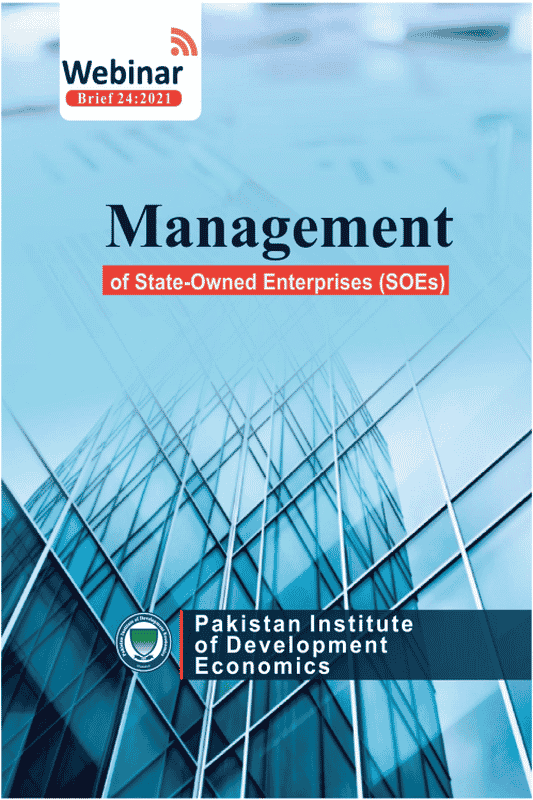Management Of State Owned Enterprises (Soes)
Management of State-Owned Enterprises (SOEs)
When the whole world is dealing in the fourth industrial revolution and busy with how to develop 5G and get control over the space. Pakistan’s government is still stuck that whether it should get rid of loss-making public enterprises or keep them. Certainly, sane and rational voices will advocate the other way. Over the years SOE’s are repeatedly making billions of losses, which should have to be profitable. Unfortunately, no one is giving proper attention to such losses and everyone is busy to butter their own bread. The losses of the top 10 loss-making SOEs like PIA, Pakistan Railways, power companies, and the National Highway Authority account for around 90pc of the total losses each year. PIDE has arranged a very timely webinar to highlight these issues and to propose some realistic solutions that how they can be tackle.
Historical Perspective
Historically, the management of Public Enterprises (PEs/ SOEs) globally is a challenging task. A large number of countries both developing and developed, have confronted serious issues in improving the performance of their public enterprises. There have been several experiences of bringing these enterprises at par with their “counterparts in the private sector”. However, there were more failures than successes. Keeping in view the low level of operational efficiency and magnitude of complexities Prime Minister of Britain Margaret Thatcher in the 1970s promoted a program to privatize. Subsequently, during the next few decades privatization policies were adopted by a large number of countries. Some of them have been successful in privatizing a substantial part of their public enterprise sector. Perhaps the greatest success was in East Europe where a large number of PEs were successfully privatized. Privatization policy was also adopted by several West European and Afro-Asian countries but here the results were mixed.
IMF Influence
However, one panelist provided completely different arguments from the above narrated historical perspective. He was on the view that upon the insistence of IMF, Pakistan has privatized some public SOE’s, although the government was not willing at that time to do so. IMF told them to either choose their way or otherwise go on the highway. This lead to the crisis of managing public enterprises. He has also quoted a recent study of IMF, in which the importance of public SOEs was advocated that how public SOE’s are contributing to the world economy and about 50% of global GDP is comprised of these SOE’s. Europe alone has more than 600 SOE’s. In his view, SOE’s are not a problem in itself, rather it is the mismanagement that has turned it into a problem.
Role of Government
The government should only provide public goods and services. The role of government should be to facilitate businesses and not to run SOEs. Because private sectors are more successful to run businesses. They know how to put the right people in right place. They have the incentive to enhance their productivity. They have stalks attached to their businesses. They do not afford a slight mistake in the competitive market otherwise, they will be out. It is not a Gordian knot that cannot be untied. In the past, Pakistan’s SOEs were making profits. But now it has turned into loss-making entities and is sipping the taxpayers’ hard-earned income mercilessly.
Absence of Vibrant Management
There is no denying the fact that despite all the privatization, the public enterprise sector continues to be substantially large. However, it is marred by political interference, mismanagement, media hype, and lack of meritocracy. The absence of vibrant management has exacerbated the whole situation. There is also a paucity of coordination between different ministries to run these SOE’s. Everyone is trying to grind their axes on the pretext of national interest. There is no place for professionals. The whole country is hijacked by elites and retired generals who are the jacks of all trades and the result is crystal clear.
Way Forward
Nevertheless, all is not lost and every problem has some remedy. By providing space to academia and intellectuals to work on the failures of these SOEs and propose some proper solutions. These SOEs should be studied from every angle and input should be taken from professionals, civil society, and well aware citizens. Moreover, the proper focus should be given to the management. This should be properly investigated that what is wrong with our management system? Why there are no good and capable people on our boards and decision-making? It is also the need of the hour to bring proper check and balance and incentives are offered to the good performers and penalties to the bad performers.
One remedy is that the government can adopt a ‘mixed ownership model’ whereby the government owns the companies but these are run and managed by independently hired professionals without intervention from bureaucrats or politicians. Unless the reform program has room for transferring the management of firms whose ownership the government plans to retain, successfully restructuring SOEs will not be possible. As the whole world is moving toward a decentralized management system and they are doing very well and are extremely successful. The government needs to learn from the past failures and should develop a proper framework for the profitable operation of SOEs.




